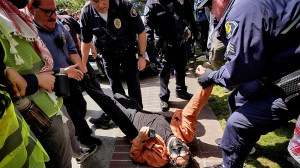- India
- International
In Gujarat HC, govt defends EWS quota: It’s classification not reservation
Defending the ordinance, it argued that the provision of 10 per cent quota was a classification of EWS and not reservation per se as prescribed under the Constitution.
The Gujarat government Wednesday filed an affidavit in the High Court claiming that its ordinance for providing 10 per cent quota to economically weaker sections (EWS) did not violate provisions of the Constitution or the Supreme Court orders.
Defending the ordinance, it argued that the provision of 10 per cent quota was a classification of EWS and not reservation per se as prescribed under the Constitution.
The government said that it promulgated the ordinance following 225 representations from different sections which “narrated their plights about discrimination and difficulties as well as educational and employment problems faced by the students and candidates of unreserved categories i.e. other than Schedule Castes, Schedule Tribes and Socially and Educationally Backward Classes.”
[related-post]
Watch Video: What’s making news
The reply was filed by Kaluji G Vanzara, Additional Secretary, Social Justice and Empowerment Department, Gandhinagar. It said that a high-powered committee comprising of five ministers under the chairmanship of Nitin Patel, Minister for Health and Family Welfare, considered such representations and demand of Patidars to be included in Socially and Educationally Backward Class.
The committee also considered similar demand of “Brahmin, Rajput and many others”, the reply added.

It further argued that the ordinance was not classified as “reservation as provided under Articles 15 (4) and 16 (4) of the Constitution”, adding that already 8448 students, who belonged to EWS category, had been given admission in engineering courses. Similar provisions, it said, had been issued for admission to 11 other courses, including medical.
The state government defended its move citing Article 46 of the Constitution which deals with directive principles of the state policy and provides that the state should promote educational and economic interest of the weaker sections more particularly schedule castes and schedule tribes (SC/ST).
“The concept of ‘weaker section’ in Article 46, has no such limitation in as much as, the individuals belonging to weaker sections, may not form a class and they may be weaker as individuals only,” the reply stated.
On the aspect of the ceiling of 50 per cent reservation for SC/ST and Socially and Educationally Backward Classes, which are collectively called as “Backward Classes” under Article 16 (4), the government’s reply said: “The ordinance in question provides for classification/categorisation amongst the open category to the extent of 10 per cent which is not reservation as provided under Articles 15 (4) and 16 (4).”
It added that even in the case of “Backward Classes”, as defined under the Constitution, the reservation can exceed the ceiling of 50 per cent “if facts and circumstances of the case warrant so”.
Saying that the EWS quota did not affect the existing reservation for SC/STs among others, the reply stated that there was already 2 per cent reservation under sports category in addition to the “alleged” reservation of 10 per cent.
“One can’t jump to the conclusion that total reservation in the state is 61 per cent (49%+10+2) which is more than the specified number as stipulated by the Supreme Court,” the reply said.
Apr 27: Latest News
- 01
- 02
- 03
- 04
- 05































